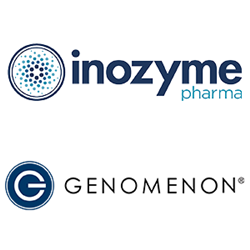
“Genomenon’s AI-driven data has the potential to greatly increase our collective understanding of ENPP1 Deficiency.” – Axel Bolte, Inozyme Pharma
ANN ARBOR, Mich. (PRWEB)
November 11, 2021
Genomenon, Inc.®, an AI-driven genomics company, announced a partnership with Inozyme Pharma to make critical information readily accessible to genetic testing labs and clinicians. This information will help inform diagnosis and thus treatment decisions in patients with ENPP1 Deficiency, a rare disease also known as generalized arterial calcification of infancy (GACI) or autosomal recessive hypophosphatemic rickets Type 2 (ARHR2).
Inozyme Pharma focuses on the development of therapeutics that treat diseases of abnormal mineralization—one of these is ENPP1 Deficiency. ENPP1 Deficiency is a progressive diverse condition with serious manifestations occurring throughout life. Those who present in utero or infancy can experience extensive vascular calcification and neointimal proliferation (overgrowth of smooth muscle cells inside arteries interfering with blood flow). This can result in myocardial infarction, stroke, cardiac failure or multiorgan failure. The condition is lethal in an estimated 50% of affected babies. Children and adults with ENPP1 Deficiency typically experience rickets and osteomalacia (softened bones) and can exhibit a range of signs and symptoms that can include hearing loss, joint and bone pain, arterial calcification, cardiac dysfunction, and neurological complications. There are no approved treatments for ENPP1 Deficiency.
To help inform and accelerate the diagnosis for patients of all ages with this disease, Genomenon produced the world’s most comprehensive variant landscape for ENPP1 Deficiency. This AI-driven and expertly curated genetic dataset, along with information on available clinical trials and therapies, has been made available to doctors, researchers, and clinicians through Genomenon’s Mastermind® Genomic Search Engine.
“Genomenon’s collaboration with Inozyme Pharma represents a shared mission to ensure that no rare disease patient goes undiagnosed or untreated,” said Mike Klein, CEO of Genomenon. “In the rare disease space, knowledge is power—and this effort will put critical information at the fingertips of doctors seeking diagnoses for their patients.”
“Genomenon’s AI-driven data has the potential to greatly increase our collective understanding of ENPP1 Deficiency,” said Axel Bolte, MSc, MBA, Inozyme’s co-founder, president, and CEO. “We expect our collaboration will improve the speed and accuracy of the diagnostic journey for patients with ENPP1 Deficiency by providing the data to them, their caregivers, and medical teams to make informed decisions about their disease, ongoing research, and clinical trials².”
Understanding rare diseases remains a significant challenge for clinicians because actionable information is limited. Many rare diseases have an underlying genetic cause, and treatment plans depend on accurate and timely diagnosis. However, these diagnostic journeys can be complex, exhausting, and time-consuming for patients and their families. In fact, undiagnosed rare disease patients lose an average of 4.8 years¹ of missed intervention opportunities waiting for answers. And once a diagnosis is made, the lack of information on available therapies presents another frustrating scarcity—leaving patients and their caregivers with very few options.
Mastermind is used by more than 1,000 genetic testing laboratories and medical centers across the globe, connecting patient DNA to relevant scientific research in order to make diagnosis and treatment decisions. The data produced by this collaboration will provide a deeper level of information, including whether certain genetic variations are known to be pathogenic for the disease. Most notably, potential treatment options and open drug trials can be easily exported into a clinical report for the treating physician and patient to review.
With its unprecedented AI-driven technology, Genomenon has gained considerable momentum in the genetic variant interpretation space. The Mastermind Genomic Search Engine breaks the “bioinformatics bottleneck” by providing rapid and meaningful genomic information to clinical diagnostic labs and researchers. This latest synergy of critical diagnostic and treatment data is a significant step toward solving the puzzle of rare disease and increasing options for patients.
Genomenon will host a webinar featuring Gus Khursigara, vice president of medical affairs and clinical strategy at Inozyme Pharma on Thursday, November 18 at 11am Eastern. Learn more and register.
About Genomenon
Genomenon is an AI-driven genomics company that organizes the world’s genomic knowledge to connect patient DNA to scientific research in the diagnosis and development of treatments for patients with rare genetic diseases and cancer.
Genomenon was named Global Company of the Year in Clinical Genomics Interpretation by Frost & Sullivan.
For more information, visit Genomenon.com
About Inozyme Pharma
Inozyme Pharma, Inc. (Nasdaq: INZY), is a rare disease biopharmaceutical company developing novel therapeutics for the treatment of diseases of abnormal mineralization impacting the vasculature, soft tissue, and skeleton. Through our in-depth understanding of the biological pathways involved in mineralization, we are pursuing the development of therapeutics to address the underlying causes of these debilitating diseases. It is well established that two genes, ENPP1 and ABCC6, play key roles in a critical mineralization pathway and that defects in these genes lead to abnormal mineralization. We are initially focused on developing a novel therapy to treat the rare genetic diseases of ENPP1 and ABCC6 Deficiencies.
Inozyme Pharma was founded in 2017 by Joseph Schlessinger, Ph.D., Demetrios Braddock, M.D., Ph.D., and Axel Bolte, MSc, MBA, with technology developed by Dr. Braddock and licensed from Yale University. For more information, please visit Inozyme.com.
_________________________________________
1. Hartin, et al. (2020). Expediting rare disease diagnosis: A call to bridge the gap between clinical and functional genomics. Molecular Medicine, 26(1). https://doi.org/10.1186/s10020-020-00244-5
Share article on social media or email:

